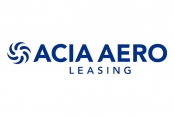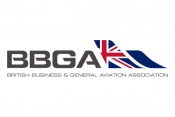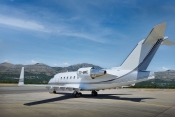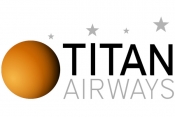UK business aviation operators in buoyant mood at BBGA annual conference
Thursday 9th March 2023
Reflecting on a ‘rollercoaster of two years,’ we have almost forgotten the language of good, but we saw just that in 2022 across all parts of our business, highlighted Alex Durand, CEO of SaxonAir and Deputy Chair of the British Business General Aviation Association (BBGA). “Now we are debating whether we reinvest or just stay as we are.”
Alex was speaking in London during a media briefing at BBGA’s annual conference, sponsored by Hunt & Palmer Group.
George Galanopoulos, Chair and CEO of Luxaviation UK agreed. As a group, we performed well, he said. Last summer, Luxaviation welcomed six aircraft to the global fleet, five available for charter from a Bombardier Global 5000 to a Beechcraft King Air 200. This led to a positive outlook for 2023. The effects of Brexit have got better, although some countries are more challenging than others, he said.
Despite experiencing two of the most difficult years, we doubled the size of our group in 2022, said Gus Paterson, COO of Centreline. Parent Pula Aviation Services acquired Wycombe-based AirParts and the remnants of Capital Air Ambulance, enabling Centreline to add aeromedical capability.
Centreline was also successful with an MoD bid to source and procure two VIP aircraft and bring them into service. We heard we had won the bid on January 11 and we had the aircraft (two Falcon 900LX) in service on 1st June. “This was a herculean effort by our team and Dassault, who were very pleased (to be the chosen OEM),” he said. In addition, Pula Aviation Services is extending its Part 145 capability in Guernsey to Northolt Airport.
SaxonAir, part of the Klyne Aviation Group, also runs the Business Aviation Centre and hangar facility at Norwich Airport. Alex reported that revenue is up. “Our hangar space is full of tenants and our operations, especially helicopter charter, (which has grown where airlines and train operators have reduced their services), is doing well.” North Sea work too has been strong. SaxonAir just sold its new Leonardo AW109SP Grand and expects to increase its managed helicopter fleet from five to 10 aircraft this year. .A new Embraer Phenom 300, available for charter from London Oxford Airport, has just joined its managed fixed wing fleet.
Similarly, Hunt & Palmer, leading aircraft charter broker, reported it was pleased to be building on its record year in 2022. The first few months of 2023 has been equally strong, especially with large cabin charter to the US from Europe, highlighted Sandy Boyer, Sales Manager, Executive Aviation. Significantly, corporates, banks and road shows are coming back. Sister Premier Aviation, focused on music charters, has also seen a lot of demand. In the last six months of 2022 it facilitated 30 music tours.
Sustainability and SAF
Sustainability was a returning theme at BBGA’s annual conference last week. We were among the first to offer sustainable aviation fuel at Bristol, noted Gus Paterson. We have had it for two years – operators can just turn up and fuel from the bowser. It is, however, seldom used. He added that the MoD (and Royal Family) uses SAF, although not purchased from them. We occasionally use it on our aircraft, including the King Airs, said Gus.
Move into electric aircraft - SaxonAir
“We are committed to meet net zero by 2030 and a big part of that is that Norwich Airport has just agreed a SAF supply,” said Alex Durand. Electrification of aircraft is also key and we decided to take on a lease of a Pipistrel (part of Textron eAviation) aircraft, (from UK distributor Nebo Air).
SaxonAir also supported the locally built NUNCATs’ Electric SkyJeep Zenith CH750 kit plane, which made its first flight in January. “One of our pilots has become rated on the aircraft and we are now carrying out certification flights from their base in Old Buckenham, Norfolk. I didn’t think that into 2023 we would be involved with GA build projects and flight training schools, yet it’s a terrific introduction to the future of aviation for us,” said Alex.
Sustainable aviation fuel is not requested so often by clients, Hunt & Palmer’s Sandy Boyer highlighted. However, clients are keen to offset. The brokerage group works with carbon offsetting programme C-Level which offers 11 programmes worldwide, supporting indigenous populations to manage their land to offset clients’ charter costs.
During the conference we heard that nearly 80 million gallons of SAF were sold in 2022, three times more than in 2021. Yet, putting that into perspective that’s the equivalent of filling up a Boeing 777 1,800 times – the whole B777 fleet. When there is more availability and the infrastructure to deliver it, things will improve, the panel agreed.
Charter demand has been so high that aircraft availability has been a problem, noted Sandy, especially so for his colleagues in the US. And that’s been further exacerbated by the increasing number of aircraft tied into fractional programmes or jet cards. And even then, these aircraft are in greater demand that owners are finding terms becoming increasingly restrictive with black-out periods.
Newcomers to charter (and there have been many since 2022) would do well to do so via a reputable broker, highlighted Sandy. “It’s when there is a mechanical issue, which does happen, where we earn our value. We can pick up the baton and quickly help sourcing alternative aircraft. Working via a reputable broker comes with peace of mind,” he said.
Alex Durand, responding to a question about helicopter popularity, acknowledged the uptick in demand for helicopters and reflecting people wanting that memorable experience, more so than ever – travelling to special events like F1 and Glastonbury.
For Glastonbury and other popular world events, there will always be the need to travel in an expeditious way - and for some that is by helicopter or private jet. They are an important part of the infrastructure. “I live six miles from Glastonbury,” said Gus Paterson and our Bristol FBO benefits from the traffic coming in. “It would be disastrous for the economy if there was no Glastonbury,” he added.
Amidst all the positives, business aviation continues to face several challenges.
Workforce and skills shortage is an ongoing problem, the panel agreed. “We haven’t done enough to promote the attractiveness of our industry – but we pay well and there are a lot of opportunities,” said George Galanopoulos.
“We are addressing the skills shortage by promoting within,” said Gus Paterson. Beechcraft King Air pilots are moving on to the Falcon for example.
Addressing the perception of business aviation is another ongoing issue. Business aviation is well placed to learn more from its passengers, the panel agreed, because it is closer to them than any airline could be. If we could ascertain why they are flying and the spend/inward investment they are putting into the UK, I’m sure it would give us evidence that one business jet arrival brings more GDP into a UK region than a full Ryanair flight, suggested Alex Durand. We are enablers in business aviation.
The NBAA has communicated well with its (No Plane No Gain); campaign, voiced George, but we are much more conservative in Europe. As an industry we must accept we haven’t done enough. The perception now is, alas, the same as it was 30 years ago. We need to be better in putting our case forward – and do so on the social media platforms that Generation Z and Millennials use. “We have to be more proactive and keep up with the times.” He applauded the work of BBGA and Liz Moscrop’s Gearup Media with their young people video story telling campaign. Luxaviation, London Biggin Hill, SaxonAir and London Oxford Airports have all got behind that.
“We are taking the time to talk to schools about the evolution of aviation, including its electrification, said Alex Durand. Engaging with schools is very important, the panel agreed.
On the lessons learned from the global pandemic, said Gus Paterson, speaking for all of them, is that cash is always needed and not to always believe what the government tells you. “We would all have benefitted from a longer-term view and clarity on what was happening at the time. We took a decision to carry on flying during the pandemic and that was a benefit of being a diverse group.”
New charter aircraft in the UK
L- SaxonAir's new Embraer Phenom 300 lives at London Oxford Airport
R- On the San Marino registry this Bombardier Challenger 604 is managed by Luxaviation UK
About BBGA
BBGA is the UK’s national trade body representing business and general aviation. Formerly known as GAMTA and founded in 1970, its member companies span all facets of the business aviation sector. BBGA represents nearly 200 companies, including airports, corporate flight departments, operators, aviation services organisations and aircraft manufacturers. In a partnership with EBAA, all members of BBGA enjoy dual membership of both associations. Similarly, any UK based organisation seeking to join EBAA can do so via BBGA.
www.bbga.aero
Latest News

Friday 11th July 2025
ACIA Aero Leasing signs agreement for sale of first ATR72-600 Large Cargo Door Freighter to FedEx









Get Social
Twitter Linked in Facebook Instagram